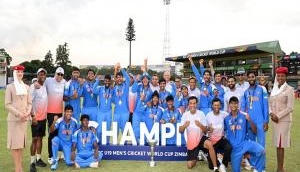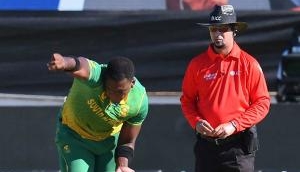Russia's Olympic dream in tatters after athletes flunk dope retests

Nearly two dozen athletes - 23 to be exact - could potentially be banned from the upcoming Summer Olympic games in Rio de Janeiro. This news came on Friday, 27 May, straight from the International Olympic Committee (IOC).
These 23 Olympians competed in five different events in the 2012 Summer Games in London, and were suspected of doping. Now, with their retests coming up positive, things look set to get uglier.
The news comes as a result of re-testing of samples. These were conducted to keep those cheating away from this year's Games. The International Olympic Committee stores samples for a decade, in order to re-test using newer methods, or to look for new drugs.
The athletes in question come from six different countries. While their names have not been disclosed, they will be named post the second sample or 'B' tests.
Also read: Why banning Kenya from Rio presents an Olympian dilemma
The IOC has retested 265 doping samples taken during the London Games using new scientific methods, as well as 454 doping samples from the Beijing Games. After these retests, the IOC has found a record number of violations from the past two Games. Alongside the 23 athletes found doping at the London Games, they also found 31 athletes - from 12 countries and six sports - from the Beijing Olympics that took place in 2008.
"These re-analyses show, once again, our determination in the fight against doping," IOC President Thomas Bach said. "We want to keep the dopers away from the Olympic Games in Rio de Janeiro. This is why we are acting swiftly now."
Including the new retest results, the past two Olympics - London and Beijing - have had 32 and 57 cases of doping, an unprecedented number. The previous highest was 26 cases from the 2004 Athens Games.
Russians the main culprits?
The Russian Olympic Committee revealed to the media that its athletes accounted for almost half of the 31 athletes found doping after the re-samples. Among these 14 athletes, 11 were track and field, two were weightlifters and one was a rower.
Russian officials are already under intense scrutiny after their entire track and field team was suspended on 13 November last year by the International Association of Athletics Federations. The IAAF suspended the team after last year's 323-page World Anti-Doping Agency (WADA) report found evidence of doping at every level of Russian athletics - from coaches and doctors to athletes.
The IAAF will decide on 17 June whether or not to lift the ban before the Games begin in August. These new revelations won't help Russia's case.
"For 2016, our recommendation is that the Russian Federation be suspended. In fact, one of our hopes is they will volunteer to take the remedial work. If they don't, the outcome may be no Russian track and field athletes in Rio. I hope they recognise it is time to change."
Also read: One year to go: Rio Olympics on the brink of embarrassment
In November, WADA released a report that conclusively said that doping was widespread among Russia's track and field programme. It also noted that this doping was 'most likely' supported by the Russian government.
A report by the New York Times(NYT) noted that Grigory Rodchenkov, the former anti-doping lab director from Russia, had supplied several athletes with drugs for years. Even more damning was when Rodchenkov told the NYT that he helped orchestrate a scheme during the 2014 Winter Olympics in Sochi where tainted urine samples were replaced with clean samples through a hole in the wall.
"He described an overnight operation in which he switched tainted urine for clean urine that had been collected from athletes in the months before competition and passed surreptitiously through a hole in the wall of the lab building," wrote Rebecca Ruiz in the NYT.
Russia's Olympic legacy at stake
Since the days of the Soviet Union, Russia, along with its sister nations, has been dominant at the Olympics, constantly dueling with the United States for top honours. Since the 1994 Winter Olympics, the first time Russia entered the Games (after the break up of the Soviet Union), it has managed 488 medals, including 169 golds. To give you a sense of perspective, the USA, the most successful nation at the Olympics, only has 237 gold medals from the Olympics since then.
After hosts Britain, with 541 athletes, and the United States, with 530, Russia fielded the third largest contingent of 436 athletes at the last Olympics in London. Russia's track and field squad was one of the largest teams at the last Olympics, and the country ended up winning 17 medals in track and field, with only one athlete being stripped of her medals.
That athlete, Darya Pischchalnikov, who had tested positive in May 2012, was eventually banned for 10 years.
Having the entire Russian track and field team banned for these Olympics will leave a significant void.
Ten months after the Winter Olympic Games in Sochi, Russia, a German TV documentary dropped a bombshell - 99% of Russian athletes engaged in illegal doping and officials had accepted bribes from these very athletes to keep silent.
Documents have revealed that the IAAF knew of Russian doping as far back as 2009 with 42% of Russian athletes failing blood tests.
Kenya to be banned as well?
WADA is facing another dilemma. It has been at the forefront of pushing Kenya towards amending its anti-doping laws. The question posed now is whether or not to disqualify the African nation from the Rio Games.
Paul Dimeo writes for The Conversation on this very question. The data is clear. Since 2011, more than 40 athletes have failed drug tests, with 18 of these 40 currently serving bans. "Kenya's non-compliance would mean it had not fulfilled all the requirements of the World Anti-Doping Code."
The problem facing the Kenyans is their non-compliance with the World Anti-Doping Code, maybe a snub at the Olympics will finally get them to relook their policies.
More on the Olympics:
Also read: Serena Williams to go 'super protected' to Rio Olympics amid concerns over Zika
Also read: Qualify for the Olympics, win gold at test event: All in a day's work for ace gymnast Dipa Karmakar
Also read: Rio Olympics 2016: And Salman Khan is our goodwill ambassador!
First published: 30 May 2016, 11:52 IST






![BJP's Kapil Mishra recreates Shankar Mahadevan’s ‘Breathless’ song to highlight Delhi pollution [WATCH] BJP's Kapil Mishra recreates Shankar Mahadevan’s ‘Breathless’ song to highlight Delhi pollution [WATCH]](https://images.catchnews.com/upload/2022/11/03/kapil-mishra_240884_300x172.png)

![Anupam Kher shares pictures of his toned body on 67th birthday [MUST SEE] Anupam Kher shares pictures of his toned body on 67th birthday [MUST SEE]](https://images.catchnews.com/upload/2022/03/07/Anupam_kher_231145_300x172.jpg)






